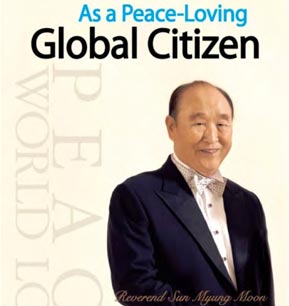ShareThis
Rev. Sun Myung Moon

As a Peace-loving Global Citizen is the autobiography of Rev. Sun Myung Moon, the founder of the Unification Movement. It was published in 2009 in both Korean and English by Gimm-Young Publishers of Seoul, South Korea. The book was released in South Korea on March 9, 2009 and debuted at #3 on the Businesss bestseller's list. It has ranked in various bestseller lists since then and was ranked 15th on the General bestseller's list as of October 14, 2009.
A Grain of Rice Is Greater Than the Earth
Everyone grew thin under the pressure of hard labor. I was the exception. I was able to maintain my weight at 159 pounds, making me an object of envy for the other prisoners. I always excelled in physical strength. On one occasion, though, I became extremely ill with symptoms similar to tuberculosis. I had these symptoms for nearly a month. However, I did not miss even a day of work at the factory. I knew that if I were absent other prisoners would be held responsible for my share of the work. People called me “the man like a steel rod” because of my strength. I could endure even the most di-cult work. Prison and compulsory labor were not such a big problem for me. No matter how fierce the beating or terrible the environment, a person can endure if he carries a definite purpose in his heart.
Prisoners were also exposed to sulfuric acid, which was used in the manufacture of ammonium sulfate. When I worked at the Kawasaki steel mill in Japan I witnessed several instances in which a person cleaning vats used to store sulfuric acid had died from the effects of acid poisoning. The situation in Heungnam was far worse. Exposure to sulfuric acid was so harmful that it would cause hair loss and sores on our skin that oozed liquid. Most people who worked in the factory would begin vomiting blood and die after about six months. We would wear rubber pieces on our fingers for protection, but the acid would quickly wear through these. The acid fumes would also eat through our clothing, making them useless, and our skin would break and bleed. In some cases, the bone would become visible. We had to continue working without so much as a day’s rest, even when our sores were bleeding and oozing pus.
Our meal rations consisted of less rice than it took to fill two small bowls. There were no side dishes, but we were given a soup that was radish greens in saltwater. The soup was so salty it made our throats burn, but the rice was so hard we couldn’t eat it without washing it down with the soup. No one ever left even a single drop of the soup. When we received our bowl of rice, prisoners would put all the rice into their mouths at once. Having eaten their own rice, they would look around, stretching their necks sometimes to watch how the others ate. Sometimes someone would put his spoon in someone else’s soup bowl, and there would be a fight. One minister who was with me in Heungnam once said to me, “Let me have just one bean, and I will give you two cows a.er we get out of here.” People were so desperate that if a prisoner died at mealtime, the others would dig out any rice still in his mouth and eat it themselves.
Wednesday, November 24, 2010
|
Labels:
A Grain of Rice Is Greater Than the Earth part3
|
CONTENT
- FOREWORD
- CHAPTER ONE - Food is Love
- CHAPTER TWO - A River of Heart Flows with Tears
- CHAPTER THREE - The Man with the Fullest Stomach
- CHAPTER FOUR - Why We Work Globally
- CHAPTER FIVE - True Families Create True People
- CHAPTER SIX - Love Will Bring Unification
- CHAPTER SEVEN - Future of Korea, Future of the Wor...
- CHAPTER EIGHT - Message for Young People

